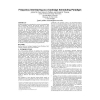Free Online Productivity Tools
i2Speak
i2Symbol
i2OCR
iTex2Img
iWeb2Print
iWeb2Shot
i2Type
iPdf2Split
iPdf2Merge
i2Bopomofo
i2Arabic
i2Style
i2Image
i2PDF
iLatex2Rtf
Sci2ools
98
Voted
CODES
2000
IEEE
2000
IEEE
Frequency interleaving as a codesign scheduling paradigm
Frequency interleaving is introduced as a means of conceptualizing and co-scheduling hardware and software behaviors so that software models with conceptually unbounded state and execution time are resolved with hardware resources. The novel mechanisms that result in frequency interleaving are a shared memory foundation for all system modeling (from gates to softwareintensive subsystems) and de-coupled, but interrelated time- and state-interleaved scheduling domains. The result for system modeling is greater accommodation of software as a configuration paradigm that loads system resources, a greater accommodation of shared memory modeling, and a greater representation of software rs as a system architectural abstraction. The results for system co-simulation are a lessening of the dependence on discrete event simulation as a means of merging physical and non-physical models of computation, and a lessening of the need to partition a system as computation and communication too early in ...
CODES 2000 | Frequency Interleaving | Greater Accommodation | Shared Memory | Software Engineering |
| Added | 30 Jul 2010 |
| Updated | 30 Jul 2010 |
| Type | Conference |
| Year | 2000 |
| Where | CODES |
| Authors | JoAnn M. Paul, Simon N. Peffers, Donald E. Thomas |
Comments (0)

